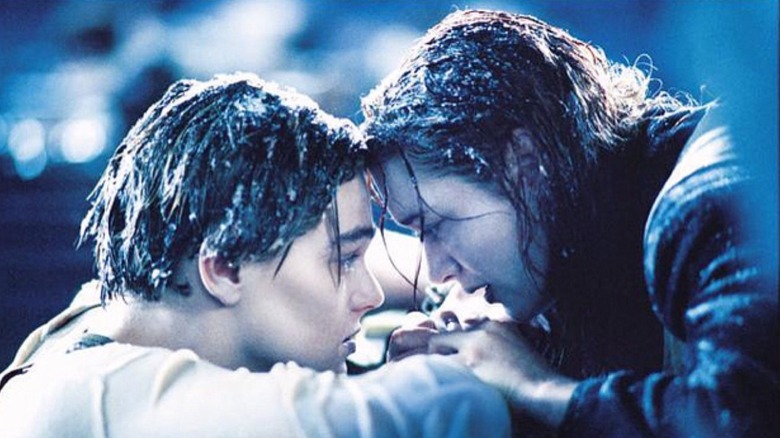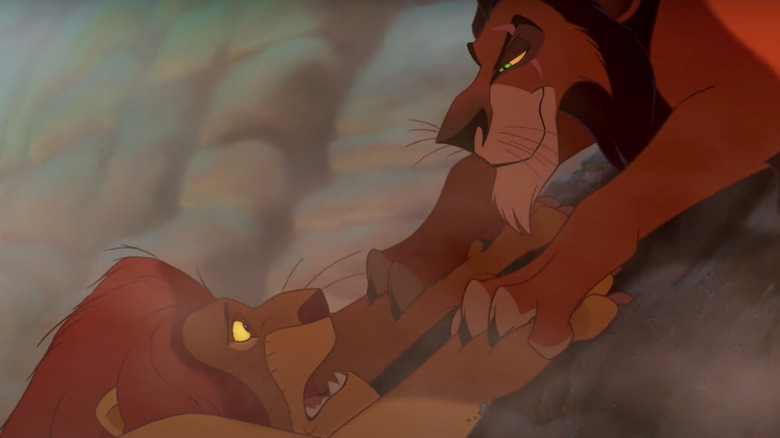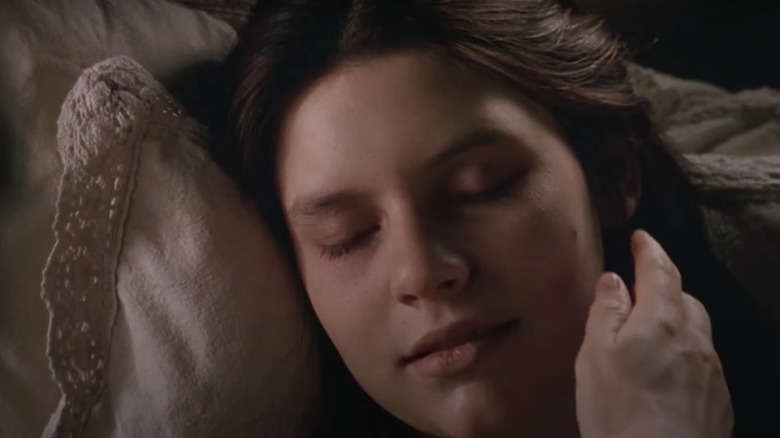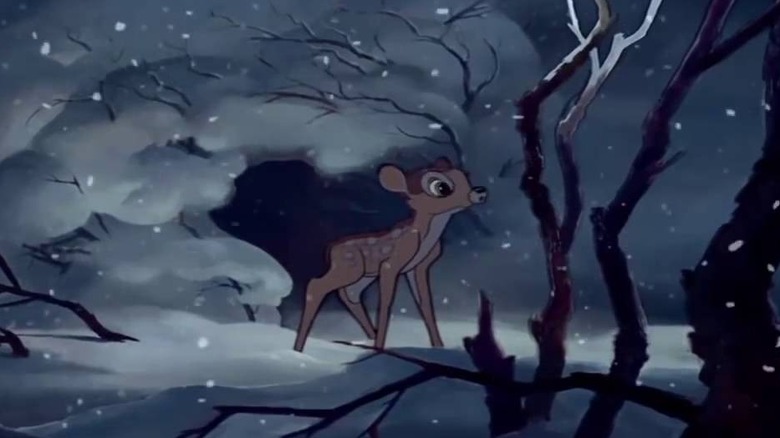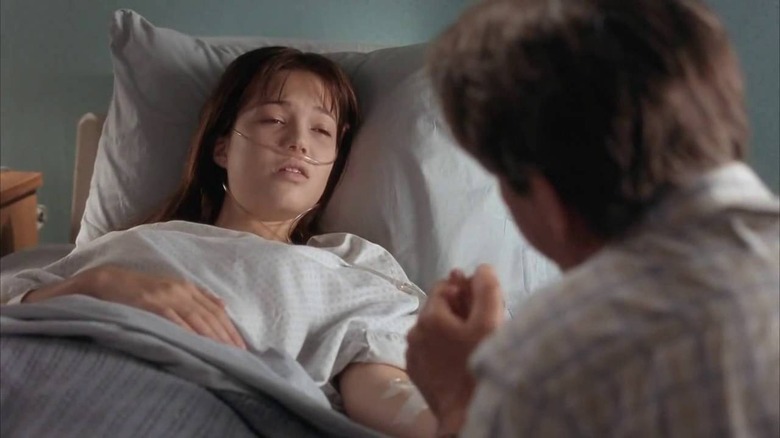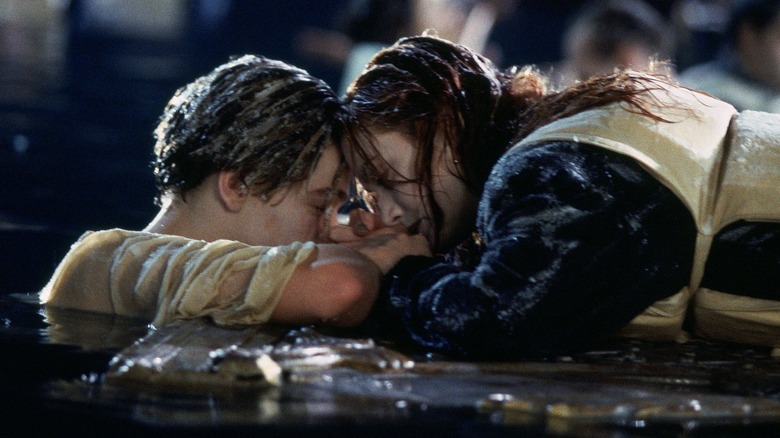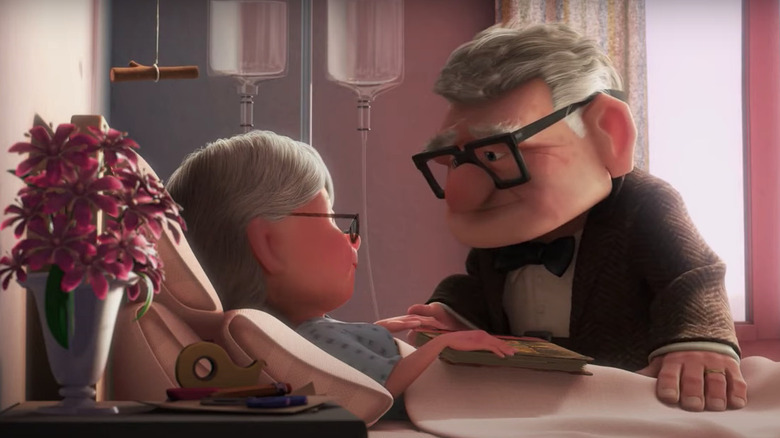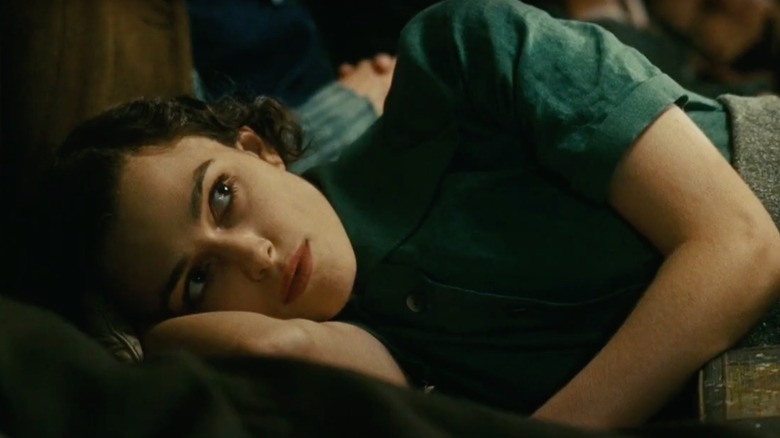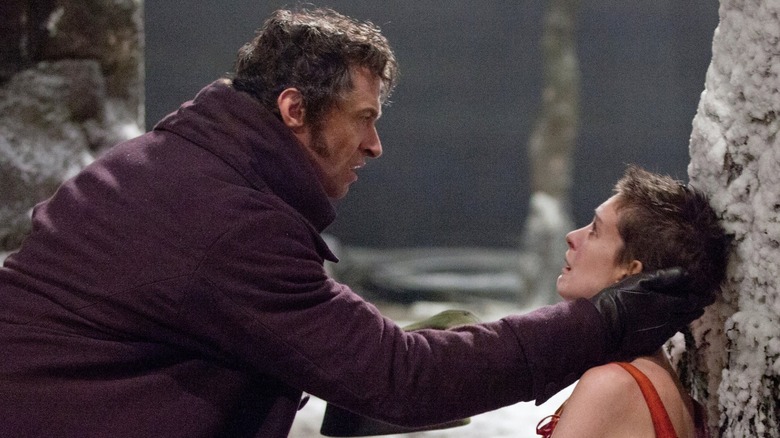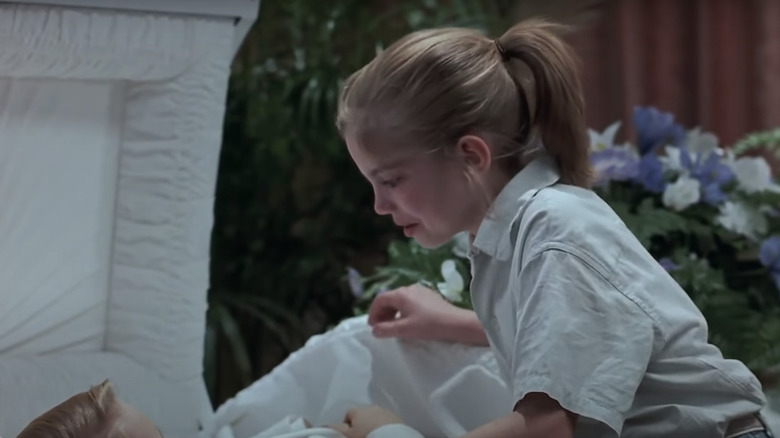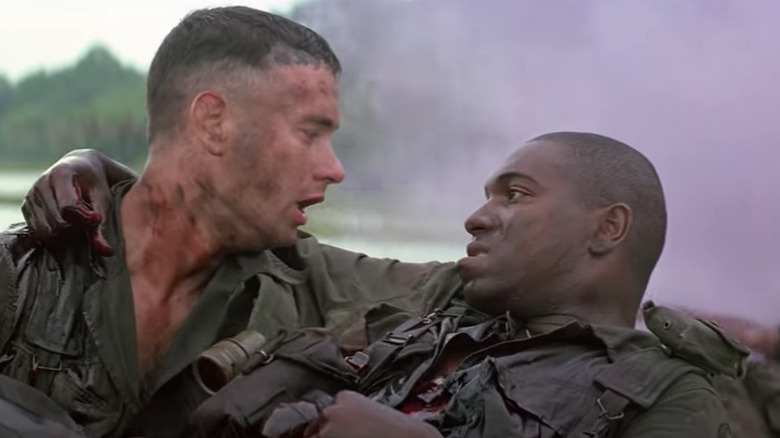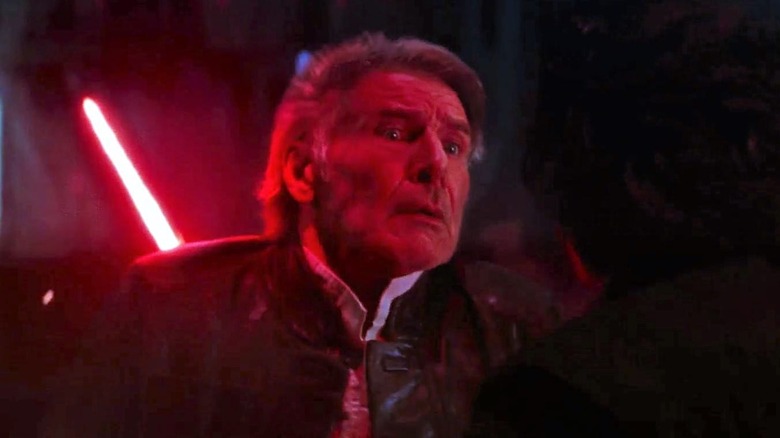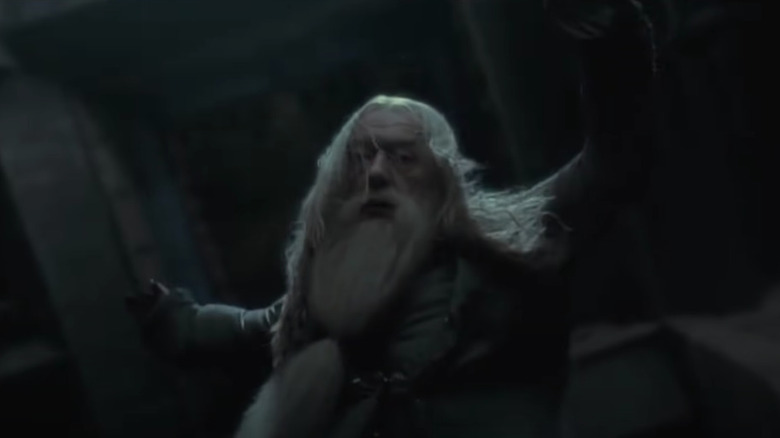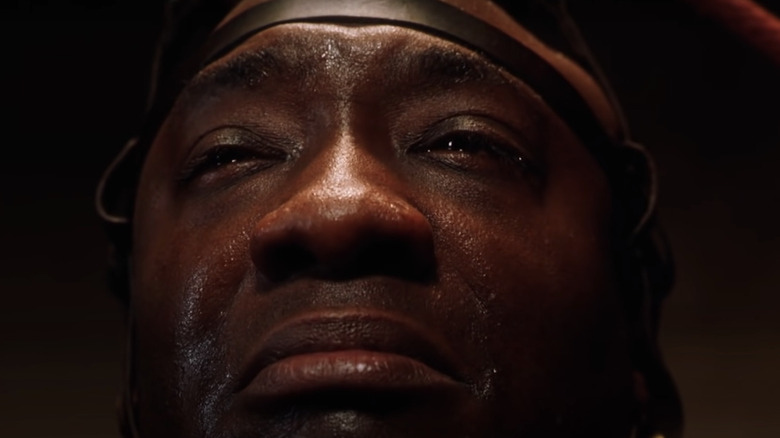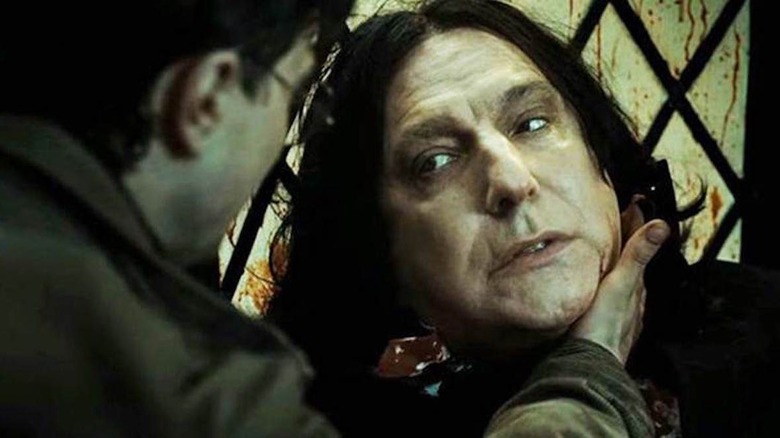The Most Traumatic Movie Deaths That Stick With Us Today
Nothing is quite as hard to watch as the death of one of your favorite film characters. Even though we know they're not real, movie deaths can be seriously devastating to watch (via Psychology Today); after watching a character evolve over the course of the film, it's heartbreaking when they die unexpectedly, ruining all hope of a happy ending.
But in the interest of posterity, we've taken a look at some of the most traumatic deaths in movie history — these are the death scenes that left us in floods of tears and wondering why the screenwriters could be so cruel. And while it can be difficult to see a lovable character die on screen, every now and then it's kind of nice to have a good cry. Ready to relive some of the saddest movie moments of all time? Grab the box of tissues and let's take a look at the most traumatic movie deaths that still stick with us today.
Mufasa falls to his death in 'The Lion King'
One of the saddest death scenes came in "The Lion King," when we had to see as the young Simba watched on helplessly as his father fell into the path of a stampede. We'll probably never forget the horrible sound of Simba's grief-stricken cries for his father after the stampede had passed by. There's no doubt about it — this death scene will leave you with a lump in your throat and a tear in your eye.
As Vulture noted, this devastating scene has lived on in our memories since "The Lion King" was released in 1994. In fact, many children were totally traumatized as kids watching the whole thing play out. But apparently, this death scene wasn't always meant to be quite so horrific — it was once written in much less detail. It was Rob Minkoff, the film's co-director, who decided to make the scene depict the minute details. "We needed to do the opposite of 'Bambi,'" Minkoff explained. "We were trying to test the boundaries of what was possible in an animated movie, a family movie, a Disney movie." So, he and his team decided to reshape the death scene to show the sheer reality of death. No wonder we've never forgotten it!
Beth March dies from an illness in 'Little Women'
As fans of the TV show "Friends" will remember, Joey was once devastated when he discovered that the charming March sister Beth dies in "Little Women." Chances are, viewers of the 1994 or 2019 film versions probably screamed out, "Beth dies!?" just like Joey when they got to the horrible death scene. As Beth tells her sister Jo in the 1994 version, "Why does everyone want to go away? I love being home, but I don't like being left behind. Now I am the one going ahead."
What makes the death even sadder is the true story that inspired the scene. As a writer explained in The Paris Review, the book of "Little Women" was originally based on the life of the author, Louisa May Alcott. "[Beth] is based on Alcott's second-youngest sister, Lizzie." Apparently, Lizzie also had scarlet fever, and Lizzie also got better before she got worse, just like Beth. However, unlike Beth, Lizzie didn't have the angelic stoicism of Beth. As author Susan Cheever wrote in a biography of Alcott, "[Lizzie] lashed out at her family and her fate with an anger that she had never before expressed." Both versions of this story are heartbreaking.
Bambi's mother is shot by a hunter in 'Bambi'
Think of your most traumatizing childhood moments and the death of Bambi's mother is sure to spring to mind. The scene will leave both adults and children in tears, as watching an innocent young mother die most certainly not easy. In fact, it's downright shocking for a children's film.
As Disney producer Don Hahn told Glamour, this death scene was an important plot point as it helped to move Bambi's story along. Because Disney movies are so short, they needed a way to make things happen quickly. "In shorthand, it's much quicker to have characters grow up when you bump off their parents," he reasoned. "Bambi's mother gets killed, so he has to grow up."
However, there's also another reason: Walt Disney's own mother died in a tragic accident, which may have resulted in Disney's theme of parental death. Wow, this death scene just got way sadder.
Jamie Sullivan dies just after finding love in 'A Walk to Remember'
We all love a good Nicholas Sparks movie — even though most of these touching romances end in tragedy. "A Walk to Remember" is one such movie. This devastating story follows Jamie and Landon, two teens who fall in love despite their differing personalities. The only catch? Jamie is terminally ill with leukemia. Still, Landon helps Jamie finish completing her wish list as her illness gets worse. The couple marries, ticking off the last item on her list. Shortly after, Jamie dies — and watching a young girl die just as she finds love is nothing short of devastating.
It turns out, this story is actually based on the author's real life. "'A Walk to Remember' was inspired by my sister," Sparks wrote on his website. Pretty much everything that happened to Jamie in the movie also happened to Sparks' sister — she even married her childhood sweetheart. "It was just about the sweetest thing that's ever been done for anyone, and I suppose I wrote this novel not only so that you could get to know my sister, but so that you would know what a wonderful thing it was that her husband once did for her," he wrote.
Jack freezes to death in 'Titanic'
Few movie deaths had the impact on viewers that Jack's death in "Titanic" did. The famous film set on the famously doomed ship followed Rose and Jack, two star-crossed lovers who fell in love on the transatlantic crossing. When the ship struck an iceberg, viewers all knew what was coming. Instead of taking her place in a lifeboat, Rose stayed by Jack's side. Eventually, the pair ended up in the water, with Rose lying on a plank of wood that (apparently) didn't have enough room for Jack. When a lifeboat finally comes to their aid, Rose realizes that Jack has heartbreakingly frozen to death to death as Celine Dion's "My Heart Will Go On" begins to play.
As the film's director James Cameron said in a Vanity Fair interview, some fans still questioned why Jack couldn't fit on Rose's plank. "The answer is very simple," he revealed. "Because it says on page 147 [of the script] that Jack dies." He went on, "I think it's all kind of silly, really, that we're having this discussion 20 years later. But it does show that the film was effective in making Jack so endearing to the audience that it hurts them to see him die."
Ellie dies after an emotional montage in 'Up'
If you're looking for a death scene that will leave you sobbing, look no further than Ellie's death in "Up." What's remarkable about this death? Well — nothing. And that's what makes it so heartbreaking. At the beginning of "Up," we're treated to a delightful and devastating montage in which a young couple, Karl and Ellie, meet as children and bond over their love of adventure. As they grow up, they fall in love. They marry, move into their own home and grow old together. It's a charming, heartwarming, truthful portrayal of a full married life. However, at the end of the montage, we see Karl return home alone — Ellie has died.
It's pretty hard to watch this scene without tearing up. As one viewer wrote in The Guardian, the first time she watched the movie was on an airplane and she was left in tears. "Little did I realize that within 10 minutes of putting my headphones on and pressing play, I would be reaching for my travel tissues and stifling sobs as passengers either side of me stared awkwardly into their complimentary peanuts and pretended not to notice." Sounds about right!
Robbie and Cecilia die during the war in 'Atonement'
Death scenes in films are especially sad when we can imagine the life that wasn't lived by the ill-fated character. In "Atonement," the death scenes are even worse because we don't have to imagine — the alternate reality is tantalizingly played out on the screen. "Atonement" tells the story of Cecilia and Robbie. Just as they are about to consummate their love, Cecilia's younger sister Briony comes into the room. In a fit of childish jealousy, she accuses Robbie of assaulting another woman. Because of Briony's accusation and the ensuing Second World War, the pair never get to be together.
However, Briony, a writer, makes up a story in which they can. Right after the audience sees the couple living together, Briony reveals that their happy ending was all imagined and both Robbie and Cecilia died during the war. Talk about a twist ending that stabs us right in the heart.
As Vulture notes, this shock ending frustrated and devastated readers of the book and viewers of the film. As the book's author said, "Over the years I've encountered many people who will be absolutely infuriated [by the ending], but I can't help feeling very flattered by that."
Fantine dies after sliding into poverty in 'Les Miserables'
The death of Fantine in "Les Miserables" is nothing short of tragic. As a single mother in 18th century France, Fantine is fired from her job and forced into sex work. She even sells her hair to pay for her daughter's upkeep. Eventually, the impoverished Fantine dies in a hospital, leaving Jean Valjean, the ex-con-turned-mayor feeling guilty for not helping her when he could. In the musical film version of "Les Miserables," Fantine's death features the haunting song "Come To Me," as Fantine imagines her daughter is with her in her final moments.
It turns out, Anne Hathaway, who played Fantine in the film version of the musical, gave Lily Collins some advice for when she played the role in a BBC adaptation. As Collins told press (via Express), Hathaway had said, "Don't lose yourself. Because it can get really tough." We can't say we're surprised to hear that Hathaway and Collins found tackling this role difficult — Fantine's downfall and eventual death are bad enough for us as viewers!
Thomas dies of bee stings in 'My Girl'
It takes some real guts to kill off a child on screen, but that's exactly what they did in the 1991 film "My Girl." The film follows Vada, played by Anna Chlumsky, an 11-year-old girl, and her best friend Thomas, played by Macaulay Culkin. As Roger Ebert wrote in his review, the film is "about young people learning the realities of life." For Vada, she has to learn about death when her friend tragically dies of an allergic reaction to bee stings.
The saddest part about this death scene is watching Vada's reaction to the news. As Ebert wrote, "The movie pays full respect to her loss; there isn't a hasty and emotional ending, but a conclusion that shows how Vada makes her accommodation with loss."
It turns out, the famous scene with the bees was actually a lot more realistic than we imagined. As Culkin told Vanity Fair, "When I was doing 'My Girl,' they released a couple of hundred bees onto me, actual live bees. I knew that this was not something that every kid was doing. At the same time, it was just another day at the office." Yikes!
Bubba dies during the Vietnam War in 'Forrest Gump'
The Tom Hanks film "Forrest Gump" is the story of one man's remarkable life. Throughout the film, Forrest tells of his encounters with famous people and events in a matter-of-fact manner. One section of the film deals with his time fighting in the Vietnam War, where his good friend Bubba is killed. Bubba's heartbreaking death comes after Forrest has saved his entire troop while looking for his friend. Forrest carries Bubba out of the woods just before they are blown up. However, Bubba dies of his injuries, saying, "I want to go home."
This scene, while heartbreaking, does give us a good lesson about death. Forrest later recalls his friend's death, saying, "If I'd known this would be the last time we'd talk I'd have thought of something better to say." As HuffPost wrote, "Forrest reminds us that our words may be the last gift we will ever give to our loved ones and we should choose them carefully."
Han Solo falls to his death in 'Star Wars: The Force Awakens
Fans of "Star Wars" were shocked when one of their favorite characters was killed off in "Star Wars: The Force Awakens." Harrison Ford's Han Solo had been part of the franchise since the first movie, so his death was a devastating blow. Han was killed by his son, Kylo Ren, who had turned to the dark side.
While fans were horrified, it turns out Ford thought the time had come for his character to die. As he told USA Today, "I wanted him to die for a long time, so I finally talked them into it. Not for the — just to dispose of him, but to ennoble his participation and give the whole tune some bottom." And in an interview on "Jimmy Kimmel Live," Ford joked, "I argued to them for 30 years for this to happen and finally I wore 'em down." It sounds like Ford though this was the most meaningful way his character's journey could end.
Albus Dumbledore sacrifices himself in 'Harry Potter and the Half Blood Prince'
Albus Dumbledore was one of the most beloved characters in the "Harry Potter" franchise. Naturally, when he died in the sixth book and movie, fans were distraught. In the memorable death scene, Harry watches from below the floorboards of one of the Hogwarts' towers as the infamous potions master Severus Snape dealt the final blow — or in this case, spell — and Dumbledore fell from the tower. Of course, it later turned out that Dumbledore had asked Snape to kill him. Nevertheless, this death was a hard one to watch.
It turns out, the death of Dumbledore could have been a lot more moving with a full-blown funeral scene, but the producers simply didn't have the budget. As actress and "Harry Potter" superfan Evanna Lynch told her co-stars James and Oliver Phelps on their podcast "Normal Not Normal," she was desperate to give the character the right send off (via Metro). When the producers told her a big funeral scene would be too expensive to film, she offered to pay for it with her own paycheck. "And [producer David Heyman] was like, 'Evanna, it wouldn't cover it!'"
John Coffey is executed in 'The Green Mile'
"The Green Mile," based on the book by Stephen King, tells the story of a man sentenced to death for the terrible murder of two girls. However, it turns out, he didn't commit the crime. In fact, John Coffey possesses healing powers and he was actually trying to help. To that end, after learning about how John is a misunderstood, kind-hearted man, John's execution by electrocution is a horrible thing to watch.
While this scene is deeply disturbing, it can also help viewers to release their own emotions. As one reviewer wrote in The Artifice, "Coffey's execution creates a cathartic response, reducing the audience to tears through emotional sadness." The audience is tricked into this response, the reviewer writes, through directorial techniques: "The non-diegetic orchestral score is used throughout to dictate the audience's emotions and increases in volume as the execution draws closer to manipulate the audience's emotional sadness to increase," and "the slow editing pace of the sequence forces the audience to dwell on the event and the moment of sadness as Coffey is executed." No wonder we are all left in tears at the end of this scene.
Severus Snape is killed in 'Harry Potter and the Deathly Hallows: Part II'
Throughout the "Harry Potter" series, it was always unclear if Severus Snape was good or bad. Dumbledore always trusted him, telling Harry he was no longer working for Lord Voldemort as a deatheater. However, when Snape killed Dumbledore in the sixth movie, Harry was convinced that Dumbledore had been wrong. However, in the final movie, Snape is killed by Voldemort's snake. Harry captures his memories just in time and uses a magical device to find out the truth about Snape: that he always loved his mother Lily, and everything he had done was meant to protect her child. Snape was redeemed, but it was too late. Cue the tears!
As Alan Rickman wrote in a goodbye letter to the series for Empire, "Three children have become adults since a phone call with Jo Rowling, containing one small clue, persuaded me that there was more to Snape than an unchanging costume, and that even though only three of the books were out at that time, she held the entire massive but delicate narrative in the surest of hands" (via BuzzFeed). It sounds like Rickman may have known Snape's secret all along, too.
